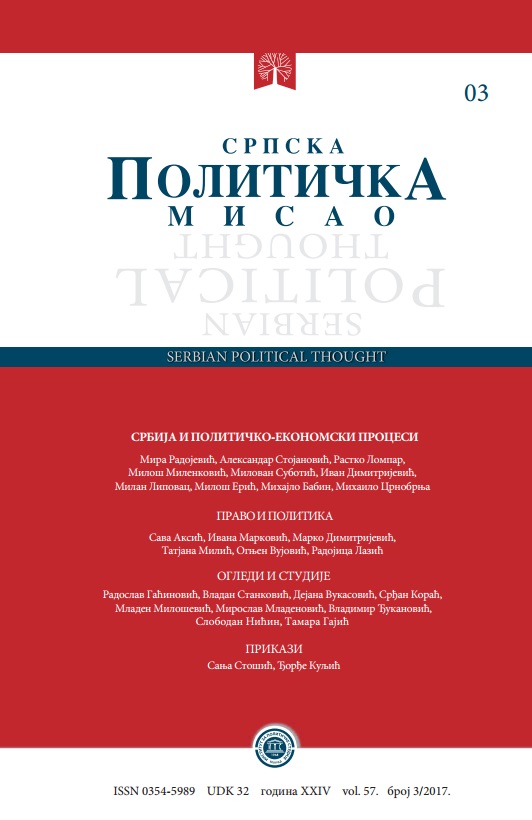Насилни недржавни актери и позиција Србије
Violent Non-State Actors and the Position of Serbia
Author(s): Miloš R. Milenković, Milovan R. SubotićSubject(s): Security and defense, Criminology
Published by: Институт за политичке студије
Keywords: violent non-state actors; weak states; violence; criminal groups; corruption; terrorist organization; Serbia
Summary/Abstract: We are witnesses that today, at the beginning of the 21st century, violent non-state actors are taking predominance of the state as the dominant, and in some epochs the only one, security actor. Number of interstate conflicts is getting lower, and there are more those in which violent non-state actors represent at least one of the opposing sides. It is noticeable that the strength of the non-state actors is inversely proportional to the strength of the state. As the state’s strength getting lower, influence and the number of violent non-state actors is getting stronger, and vice versa. Primary feature of the violent non-state actors is using force “without permission of the state”. However, violent functions are different in their operations. To some, violence is a means to en end, and to others violence is the aim. Striving to occupy and control the bigger territory and resources of the state, violent non-state actors are actually striving to take over some functions of the state. And that “filling of the functional space” is considered to be the most dangerous for the state. Taking over the functions of the state, violent non-state actors over the time are taking over the legitimacy. Besides that, the fact that their functioning is not conditioned by legal norms, but is only the product of the free will of the leader or the managing body inside the organization, represents important feature. Consequently, it happens that actually there are states that are behind of the violent non-state actors. With that kind of concealed functioning, trough intermediaries, governments have opportunities to achieve their goals in perfidious way, within the borders of their state and out, violating their own laws, international norms and signed contracts. According to different parameters, authors in this paper analyze how much Serbia is susceptible regarding functions of the violent non-state actors, and to which category of actors they belong to. It’s noticeable that the main actual and the biggest security problems in Serbia, comes from acting violent non-state actors such as organized criminal groups. Dominant criminal activity in Serbia, from more of 86% of organized criminal groups, are narcotics trafficking and smuggling. Also, the report of The Fund for Peace, Fragile States Index 2015, indicates that Serbia is still a divided society, in which there is a relatively high potential for inter-ethnic and inter-religious conflicts. Itis noticeable, that Corruption, creates convenient conditions for functioning of the violent non-state actors. On that conclusion we are lead, by the Corruption Perceptions Index 2015 Transparency International, which indicate that Serbia still is above desired level, in spite of the significant efforts of the state to confront corruption. Hence, Serbia’s commitment to strengthen it’s institutions, which can be seen as a result of internal political will and strength, and partly as a result of the pressures, mostly from the European Union, reduces the space for functions of the violent non-state actors. Main conclusion is that politically strong and economically stable country is the only safe guarantee for reducing the number and impact of the violent non-state actors to the state and society as a whole.
Journal: Српска политичка мисао
- Issue Year: 2017
- Issue No: 3
- Page Range: 55-70
- Page Count: 16
- Language: Serbian

